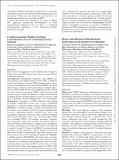| dc.contributor.author | Vickie S Braithwaite, Ayse Y Demir, Martin N Mwangi, Kerry S Jones, Ann Prentice, Andrew M Prentice, Pauline EA Andang’o, Hans Verhoef | |
| dc.date.accessioned | 2020-08-14T07:15:26Z | |
| dc.date.available | 2020-08-14T07:15:26Z | |
| dc.date.issued | 2020-04 | |
| dc.identifier.uri | https://repository.maseno.ac.ke/handle/123456789/2098 | |
| dc.description.abstract | Objectives: FGF23 decreases reabsorption and increases phosphate excretion in the kidney and regulates vitamin D metabolism. Maternal iron deficiency may be implicated in the pathogenesis of hypophosphataemia-driven rickets in offspring through perturbed FGF23 expression. We aimed to determine the effect of antenatal oral iron supplementation on maternal and neonatal markers of bone mineral regulation.
Methods: 470 rural Kenyan women with singleton pregnancies and haemoglobin concentrations ≥90g/L were randomly allocated to daily, supervised supplementation iron (60mg as ferrous fumarate) or placebo from 13–23 weeks gestational age until 1 month postpartum. We analysed maternal and neonatal plasma samples collected at birth, with primary outcomes being concentrations of FGF23 in its intact form (I-FGF23, the phosphate- and vitamin D-regulating hormone) and its … | en_US |
| dc.publisher | Oxford University Press | en_US |
| dc.subject | Bone and Mineral Metabolism, Type 2 Diabetes | en_US |
| dc.title | SUN-359 Antenatal Oral Iron Supplementation, FGF23 and Bone Metabolism in Kenyan Women and Their Offspring: A Randomised Controlled Trial | en_US |
| dc.type | Article | en_US |

